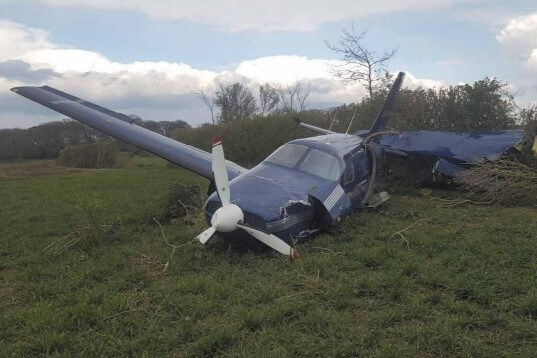UK air accident investigators have published a report into a crash of a ZeroAvia Piper PA-46 electric aircraft during flight test in 2021, when power to the electrical motors was lost.
The report publication, on July 7, 2022, comes as ZeroAvia prepares to launch flight testing of a twin-engine Dornier 228 equipped with the hydrogen powertrain that it hopes to bring to market in 2024.
The company said in response to the report by the Air Accidents Investigation Branch (AAIB) that it had taken steps to address issues raised in the report and bolster its safety credentials.
The Piper PA-46, registered G-HYZA, was carrying out experimental flight tests at Cranfield airport in the UK on April 29, 2021, when the battery was turned off as part of the test procedures to leave the single-engine aircraft powered solely by the hydrogen fuel cell.
However, the windmilling propeller generated a voltage high enough to operate an inverter protection system, which locked out power to the motors. Attempts to restart the system and restore electrical power were unsuccessful and the pilot made a forced landing in a field near to the runway at Cranfield airport.
The two people on board were not injured, but the aircraft sustained serious damage, including a detached left wing, collapsed landing gear and nose cowl distortion.
The investigators said sufficient ground testing had not been carried out and an emergency procedure to clear an inverter lock-out was not effective. The report also highlighted that an investigation had not been carried out into a previous loss of power from an inverter lock-out on a previous flight, and the risk assessment had not been reviewed. In addition, ad-hoc changes had been made to the flight test plan.
The report noted that the chief executive and the flight test director had taken on the day-to-day management of the program, despite a lack of safety and flight test experience and that their focus was on meeting key project targets.

Track of G-HYZA. Credit: UK AAIB, Crown copyright
The AAIB made five safety recommendations to the UK Civil Aviation Authority as a result of the crash, regarding additional guidance and clarity on such experimental projects and noted that ZeroAvia has taken safety actions.
“While the report does not make specific recommendations for ZeroAvia within its conclusions, many of the issues identified in the report were similarly noted in our internal investigation and have subsequently been addressed robustly,” the US-British company said in a statement.
ZeroAvia said it has made changes to its organizational culture and structure, as well as future technical designs. It has established a Safety and Security Review Board, added more qualified team members and set up a safety management system based on the principles of a ‘just’ aviation culture, including occurrence reporting, investigation and corrective actions.
“You can’t cut any corners,” James McMicking, head of strategy at ZeroAvia, said during a recent interview with AeroTime, when asked about the timeline for the Dornier flight testing. “It will take as long as it takes.”

